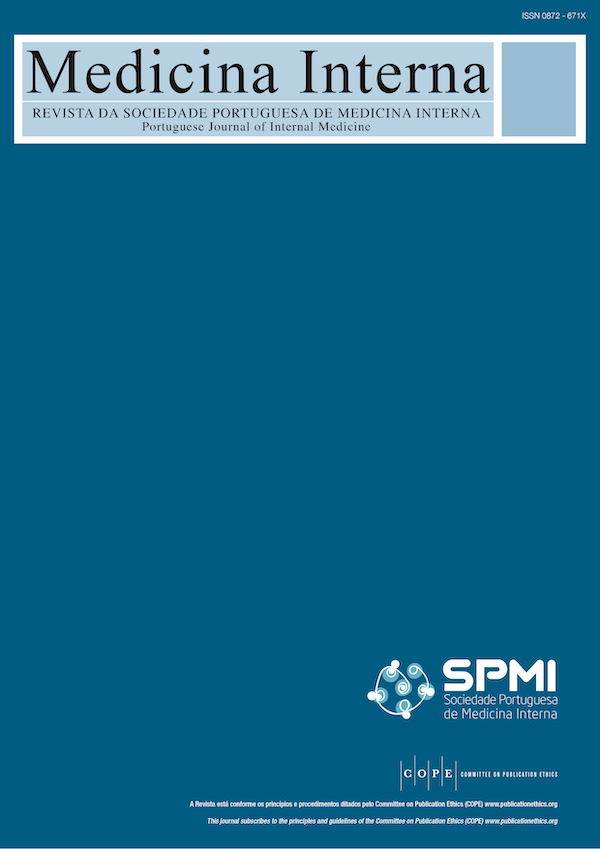Medication Reconciliation: Audit to an Internal Medicine Ward
DOI:
https://doi.org/10.24950/rspmi/O/74/19/4/2019Keywords:
Hospital Departments/organization & administration, Internal Medicine, Medication Errors, Medication Reconciliation, PolypharmacyAbstract
Introduction: Ageing population is characterized by multiple
comorbidities, polypharmacy and medication safety vulnerability. Medication discrepancies, together with the inexistence of
medication reconciliation procedures that implement National
Health Department recommendations, lead to negative consequences as drug interactions, healthcare non-programmed admissions and to geriatric syndromes.
Materials and Methods: The authors audited the prevalence
of medication reconciliation at discharge, analysing the pharmacological record and identifying discrepancies and errors
of medication. As a secondary endpoint, inward patients were
characterized. Data was collected through computer record
consultation as well as through patient or caregiver interview.
Results: Median of age was 78 years and half of patients
were totally dependent. There was a 3.9 average of comorbidities, medication reconciliation was present in 47% and in 61%
there was at least one medication discrepancy or error. The
medication error most frequently encountered was the introduction error.
Discussion and Conclusion: The high prevalence of medication discrepancies and of non- medication reconciliation is in
part due to the inexistence of a systematic process for collecting pharmacological history, poor doctor-patient communication and the lack of medication reconciliation procedure. The
higher prevalence of introduction errors may be due to copy
paste of previous and out of date pharmacological records.
There is a need for prospective studies that evaluate the medication reconciliation influencing factors, the medication errors
and its short and long-term consequences.
Downloads
References
Mannucci PM, Nobili A, Pasina L, Collaborators R. Polypharmacy in older people: lessons from 10 years of experience with the REPOSI register. Intern Emerg Med. 2018;13:1191-200. doi:10.1007/s11739-018-1941-8.
Maher RL, Hanlon J, Hajjar ER. Clinical consequences of polypharmacy in elderly. Expert Opin Drug Saf. 2014;13:57-65. doi:10.1517/14740338.201 3.827660.
Climente-Marti M, Garcia-Manon ER, Artero-Mora A, Jimenez-Torres NV. Potential risk of medication discrepancies and reconciliation errors at admission and discharge from an inpatient medical service. Ann Pharmacother. 2010;44:1747-54. doi:10.1345/aph.1P184.
Hughes RG. Tools and Strategies for Quality Improvement and Patient Safety. In: Hughes RG, editor. Patient Safety and Quality: An Evidence-Based Handbook for Nurses. Rockville: Agency for Healthcare Research and Quality;2008.
Niklas Nilsson ea. Medication discrepancies revealed by medication reconciliation and their potencial short-term and long-term effects: a norwegian multicentre study carried out on internal medicine wards. Eur J Hosp Pharm. 2015;22:298-303. doi: 10.1136/ejhpharm-2015-000686.
Greenwald JL, Halasyamani L, Greene J, LaCivita C, Stucky E, Benjamin B, et al. Making inpatient medication reconciliation patient centered, clinically relevant and implementable: a consensus statement on key principles and necessary first steps. J Hosp Med. 2010;5:477-85. doi:10.1002/jhm.849.
Grimes TC, Duggan CA, Delaney TP, Graham IM, Conlon KC, Deasy E, et al. Medication details documented on hospital discharge: cross- -sectional observational study of factors associated with medication non-reconciliation. Br J Clin Pharmacol. 2011;71:449-57. doi:10.1111/ j.1365-2125.2010.03834.x.
Kwan JL, Lo L, Sampson M, Shojania KG. Medication reconciliation during transitions of care as a patient safety strategy: a systematic review. Ann Intern Med. 2013;158:397-403. doi:10.7326/0003-4819-158-5-201303051- 00006 10.
Direcção Geral de Saúde. Reconciliação da medicação. Norma 18/2016;1- 7. Lisboa: DGS; 2017.
Tam VC, Knowles SR, Cornish PL, Fine N, Marchesano R, Etchells EE. Frequency, type and clinical importance of medication history errors at admission to hospital: a systematic review. CMAJ. 2005;173:510-5. doi:10.1503/ cmaj.045311.
Gleason KM, McDaniel MR, Feinglass J, Baker DW, Lindquist L, Liss D, et al. Results of the Medications at Transitions and Clinical Handoffs (MATCH) study: an analysis of medication reconciliation errors and risk factors at hospital admission. J Gen Intern Med. 2010;25:441-7. doi:10.1007/s11606- 010-1256-6.
Hellstrom LM, Bondesson A, Hoglund P, Eriksson T. Errors in medication history at hospital admission: prevalence and predicting factors. BMC Clin Pharmacol. 2012;12:9. doi:0.1186/1472-6904-12-9.
Cornish PL, Knowles SR, Marchesano R, Tam V, Shadowitz S, Juurlink DN, et al. Unintended medication discrepancies at the time of hospital admission. Arch Intern Med. 2005;165:424-9. doi:10.1001/archinte.165.4.424.
Knez L, Suskovic S, Rezonja R, Laaksonen R, Mrhar A. The need for medication reconciliation: a cross-sectional observational study in adult patients. Respir Med. 2011;105:S60-6. doi:10.1016/S0954-6111(11)70013-0.
Downloads
Published
How to Cite
Issue
Section
License
Copyright (c) 2019 Medicina Interna

This work is licensed under a Creative Commons Attribution 4.0 International License.
Copyright (c) 2023 Medicina Interna






